|
|
|
Sort Order |
|
|
|
Items / Page
|
|
|
|
|
|
|
| Srl | Item |
| 1 |
ID:
125075
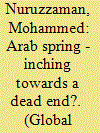

|
|
|
|
|
| Publication |
2013.
|
| Summary/Abstract |
A high degree of pessimism continues to hold a strong grip over the enthusiasts of democracy in the Arab world. In the last more than two years, the popular uprisings for social and political change have stalled in Bahrain, Syria, and Yemen. In Egypt, Libya, and Tunisia, where the populace succeeded in toppling the authoritarian rulers, the situation did not change that much. Violence, conflicts, and killings of political opponents disturbingly characterize all the Arab countries affected by the popular uprisings. In Syria, the government and opposition forces are locked in a deadly conflict with neither side being able to make a decisive breakthrough. The Egyptian army overthrew the country's first democratically elected government, headed by the Muslim Brotherhood, on 3 July 2013. On the whole, the success rate of democratization is so far disappointing. That begs the question whether the Arab popular uprisings for democratic change, what the media has conveniently dubbed the 'Arab Spring', are failing or still enduring.
|
|
|
|
|
|
|
|
|
|
|
|
|
|
|
|
| 2 |
ID:
072300
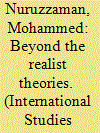

|
|
|
|
|
| Publication |
2006.
|
| Summary/Abstract |
The American war on terror and the invasion of Iraq remain spectacular developments in the history of international relations. This article probes the explanatory powers of the existing academic realist theories to account for the Bush administration's war against Al-Qaeda, a nonstate shadowy organization, and the invasion of Iraq. It argues that the realist theories are largely deficient frameworks to provide any satisfactory explanation of the war on terror and its subsequent extension to Iraq. This paper also proposes an alternative framework, the framework of "neo-conservative realism," to offer a more satisfactory explanation of America's war on terror. The framework of "neo-conservative realism," in contrast to the existing realist theories, is more flexible to account for the current neo-conservative outgrowth of American foreign policy and national security strategy.
|
|
|
|
|
|
|
|
|
|
|
|
|
|
|
|
| 3 |
ID:
114339
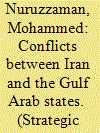

|
|
|
|
|
| Publication |
2012.
|
| Summary/Abstract |
The post-2003 Persian Gulf sub-region has witnessed intensified geopolitical conflicts and competition between Iran and the Gulf Arab states, particularly between Iran and Saudi Arabia. Scholars and experts have mostly analysed the conflicts through political and strategic prisms while neglecting their economic dimensions. This article analyses the various post-2003 conflicts between Iran and the Gulf Arab states with a focus on how economic integration or the lack thereof creates the incentives to resolve or sustain the conflicts. It concludes that low levels of trade and economic integration and the absence of an economics of cooperation between Iran and its Gulf Arab neighbours inhibit any strong initiatives to resolve the conflicts.
|
|
|
|
|
|
|
|
|
|
|
|
|
|
|
|
| 4 |
ID:
152658
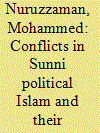

|
|
|
|
|
| Summary/Abstract |
Traditionally, the Shi’a–Sunni divide and the associated dynamics of the geopolitical struggle for power and dominance, between the minority Shi’as and the majority Sunnis, have defined intra-Islamic relations. Often sidelined were the political differences between and among groups and movements within Shi’a as well as Sunni Islam. This essay seeks to examine the ideological and political conflicts between the two dominant brands of Sunni political Islam—the conservative Islamists led by Saudi Arabia and the militant Islamists who grouped first under the banner of al-Qaeda and later the Islamic State. It briefly traces the origins of both brands of Sunni political Islam, maps out their goals and strategies, and highlights their implications for the Middle East region and the West at large.
|
|
|
|
|
|
|
|
|
|
|
|
|
|
|
|
| 5 |
ID:
179857
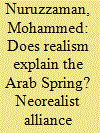

|
|
|
|
|
| Summary/Abstract |
Dominant International Relations theories—realism/neorealism, liberalism/neoliberalism, and constructivism—have so far developed no rigorous theoretical attempts to interpret the Arab Spring, though some marginal efforts have been made to critique the failure of realism to interpret this historical development. This article presents a neorealist interpretation of the Arab Spring focusing on the Syrian civil war, where conflicts between the pro- and anti-status quo forces have unfolded in alignments and counter-alignments centering around rival domestic and external groups. To explain the involvements of rival alliances in the post-2011 Syrian conflict, namely, the United States–Saudi Arabia–Israel alliance and the Russia–Iran–Syria alliance, this analysis employs neorealist theories of alliance formation—the balance of power and balance of threat theories—as articulated by Kenneth Waltz and Stephen Walt, respectively. The dynamics of these formations in Syria lend more support to Walt’s theory that states balance against threats rather than against power. The complex nature and dynamics of the Syrian war, however, calls for refinements of Walt’s balance of threat theory. Accordingly, the article also explores various refinements of Walt’s theory to better explain future complex civil wars involving highly polarized domestic and external parties.
|
|
|
|
|
|
|
|
|
|
|
|
|
|
|
|
| 6 |
ID:
115905
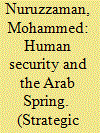

|
|
|
|
|
| Publication |
2013.
|
| Summary/Abstract |
The Arab Spring was ignited by an undeniable human security goal of achieving freedom from want, freedom from fear and freedom to live in dignity. This article analyses how human security concerns have figured in the Arab Spring and shaped its course. It makes two related arguments: firstly, that the pro-democracy forces, long deprived of basic human rights and freedoms, rose up against their authoritarian rulers to qualitatively change their human rights and security conditions; and secondly, that the NATO-led foreign intervention in Libya, to apparently aid the pro-democracy movements, has been counterproductive and has done a great disservice to the human rights and security goals of the Arab people.
|
|
|
|
|
|
|
|
|
|
|
|
|
|
|
|
| 7 |
ID:
073320
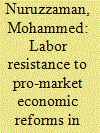

|
|
|
|
|
| Publication |
2006.
|
| Summary/Abstract |
Pro-market economic reforms enjoy less social support in most developing countries, including Bangladesh. Labor response to reform policies, in particular, has been quite unfriendly and often violent. This article analyzes labor resistance to pro-market economic reforms in Bangladesh in the decades of 1980s and 1990s. It explores the underlying causes that spurred labor resistance to market-oriented reforms, examines the successes and failures the resistance achieved or recorded and arrives at the conclusion that the spate of labor resistance in the industrial sector in the 1980s and 1990s had the potential to halt or roll back the reform program but it did not succeed due to a host of factors, including workers' disunity, ideological divide between various trade unions, lack of organizational structure, control of pro-reform national political parties over their respective trade unions, the diminishing influence of leftist trade unions in labor politics and the lack of an alternative leftist political agenda in Bangladesh politics. The leftist failure to organize workers and launch a collective movement against pro-market forces apparently promises a better future for market-oriented reforms in Bangladesh.
|
|
|
|
|
|
|
|
|
|
|
|
|
|
|
|
| 8 |
ID:
090723


|
|
|
| 9 |
ID:
155877
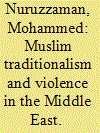

|
|
|
| 10 |
ID:
073575
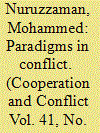

|
|
|
|
|
| Publication |
2006.
|
| Summary/Abstract |
Proponents of human security paradigm, in emphasizing the individual as the fundamental referent of security and in highlighting the non- military sources of threats to security, strongly claim a paradigm shift from the state-centric realist paradigm of security. The article disputes this, arguing that the claim for a paradigm shift from the traditional realist security paradigm is by no means new in security studies or International Relations. The basic issues that the human security paradigm brings into focus have already been well elaborated by critical theorists and feminist scholars in International Relations emphasize human emancipation through transformation of the existing rich-dominated unequal global and national power structures. Moreover, the human security paradigm shares some of the basic assumptions of the realist paradigm of security that undercut its claim of newness in contemporary security studies and International Relations.
|
|
|
|
|
|
|
|
|
|
|
|
|
|
|
|
| 11 |
ID:
175885


|
|
|
|
|
| Summary/Abstract |
Iran—US relations are in a state of flux due to President Trump’s draconian sanctions, what is dubbed the ‘maximum pressure’ campaign, to force Iran to renegotiate the 2015 nuclear deal. Iran’s ‘counter pressure’ policy, in contrast, has sought to blunt the effects of sanctions and compel the Trump administration to return to the nuclear deal. This article examines the basic thrust, goals and shortcomings of Trump’s anti-Iran campaign, and also explores Iran’s policy choices and responses to face off Trump’s campaign of ‘maximum pressure’. The prospect of slow death under sanctions and recent changes in Iran’s domestic power equations in favour of the hardliners is potentially paving the way for Iran for a war decision to permanently free itself from the suffocating shackles of US sanctions.
|
|
|
|
|
|
|
|
|
|
|
|
|
|
|
|
| 12 |
ID:
101266
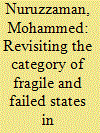

|
|
|
|
|
| Publication |
2010.
|
| Summary/Abstract |
International Relations scholars and policy-makers are increasingly paying greater attention to a new category of fragile and failed states across Asia, Africa, the Balkans, the Caucasus, Latin America and the Middle East. While effective policy responses are necessary to strengthen these politically fractured, economically collapsing and socially divided states, the category itself appears to be more politically and ideologically charged and less critically understood in the context of international relations. There is a general tendency to avoid examining how political and economic policies and military actions by the West contributed to the degeneration of these states. This article seeks to re-examine the causes of state fragility and failure, and critically reviews the current US strategies to rebuild the failed states of Afghanistan and Iraq. It argues that the US-led statebuilding strategies in both countries are based on a wrong diagnosis of the political and social problems, and the solutions offered are also ill-conceived. The article also contends that the Western liberal vision of the state, premised on the Weberian notion, commands less relevance to the fragile and failed states in the non-Western world.
|
|
|
|
|
|
|
|
|
|
|
|
|
|
|
|
| 13 |
ID:
170653
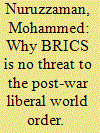

|
|
|
|
|
| Summary/Abstract |
BRICS (Brazil, Russia, India, China and South Africa) has emerged as a powerful economic group in the global economy and politics, apparently posing threats to the survival of the post-war liberal world order. Its member states (Brazil, Russia, India, China and South Africa) are seeking to democratize the post-war liberal world order to increase their shares of voting power in the decision-making processes of the Bretton Woods institutions and thus curb the USA’s dominance over global economic and financial architecture and eventually overhaul the US-led liberal world order. Contrary to the fear of many Western policymakers and analysts, this article contends that BRICS poses no credible threats to the US-led post-war order. The BRICS group’s potential to challenge or threaten the US-led world order is seriously undermined by the internal make-up of the group, its political and ideological heterogeneity, its incapacity to develop a collective world order vision salable to the wider international community and the lack of strong convergence in foreign policy goals and preferences.
|
|
|
|
|
|
|
|
|
|
|
|
|
|
|
|
|
|
|
|
|